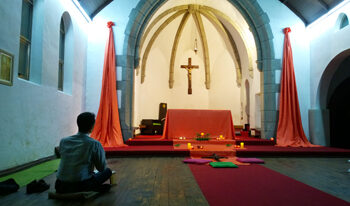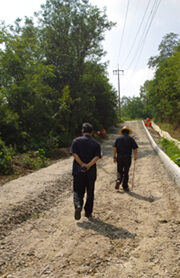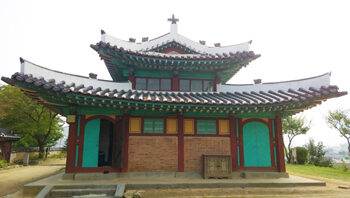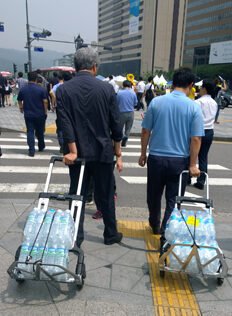ABM Archive Website
THIS WEBSITE CONTAINS ARCHIVE MATERIALS FOR HISTORICAL REFERENCE ONLY
For up-to-date information, including our latest appeals, news, and resources, please visit our current website.
The Anglican Church of Korea
During late July, ABM Programs Director, Dr Julianne Stewart, visited the Anglican Church of Korea, where ABM supports the church’s Towards Peace in Korea (TOPIK) program, and various Church to Church projects.
 |
| Bishop Onesimus Park prays at a monthly ecumenical Taize service in the Cathedral of Busan. |
The Korean word for peace, when translated literally back into English, means “share food equally”. This simple phrase sums up the commitment by the Anglican Church of Korea, based in the South, to provide humanitarian assistance to their sisters and brothers in North Korea.
The Anglican Church of Korea had always worked in whatever ways it could, as part of other Christian organisations, to further the realisation of peace between North and South Korea. But in 2005 they decided they wanted to do something more.
In that year, the church invited the Anglican Communion to go to Korea. Out of this invitation, in 2007 the Communion held its first Anglican Peace Conference in Korea. A second event took place more recently in the Japanese city of Okinawa in 2013.
TOPIK
From this 2007 conference, a new Anglican Church entity, Towards Peace in Korea (TOPIK), was born. It is separately incorporated with a professional and active Board of Directors and a license from the South Korean Ministry of Reunification to “do business” in North Korea. TOPIK works hard to take advantage of all opportunities offered to them to assist ordinary people in North Korea. Most recently this has involved purchasing and equipping (in neighbouring China) an ambulance for a hospital in the North Korean city of Najin, in consultation with the local People’s Party there. TOPIK will also provide medicines and equipment for the hospital.
North Korea is a country shrouded in mystery for most Australians, indeed for most people in the world. It has only recently been opened up slightly to allow foreign tourists access to selected and tightly controlled areas.
For many people living in South Korea, including the Anglican Church, there is a strong longing and hope for eventual peaceful reunification of the south and the north. The church has been active in several initiatives which aim to build peace. These initiatives are not restricted to material assistance to people in need in the North.
Peace Mountain
On a Sunday in late July, I was invited to attend an Anglican Church service in the South Korean town of Dongducheon, an hour or so north of Seoul.
 |
|
Walking in prayerfully up the |
This is a town where the US military bases have been stationed since the Korean War, and which are gradually being moved further south. At the small church, the Eucharist was being celebrated by Fr Joachim Kim. The congregation comprised half a dozen children and a sprinkling of young adults. The children were largely those who attend the after-school care program offered by the church to children of economically disadvantaged families in the town.
After lunch with the parish, Fr Kim drove me to the demilitarised zone that comprises the border with North Korea. In this northernmost part of South Korea a Presbyterian minister with a doctorate in Peace Studies, Prof Jiseok Jung, has established the Border Peace School. Fr Joachim goes there every week to teach the spirituality of peace, especially to young people. He puts this teaching into action as we walk in the hot afternoon sun up Soyee Mountain, the so-called ‘Peace Mountain’ in prayerful silence, to pray together at the summit, as we look over the DMZ towards the mountains of North Korea.
The Anglican Church in Korea
 |
|
The Church of Ss Peter and Paul, on Gangwha Island, built in |
The Anglican Church of Korea is a small, but dynamic, church of around 55,000 members spread over three dioceses: Seoul, Daejeon and Busan. Together these cover the whole of South Korea. The church was started by missionaries from the Church of England in the late 19thC, and has always had a strong focus on social outreach and on enculturation of Anglican Christianity within the cultural traditions of Korean society.
The church has always had a strong focus on social ministry. The TOPIK program is just one such ministry. These ministries also include a large number of after school programs for disadvantaged children, food banks and other services to the elderly and people with a disability, outreach to refugees from North Korea, as well as several overseas aid projects and fund raising for emergencies such as the recent Typhoon Haiyan in the Philippines and for the victims of conflict in Gaza.ABM’s relationship with the church dates back to the early 1960s, when Rev’d David Cobbett, an ABM missionary, was sent to Busan. His time of service there is warmly remembered and the links between the now Diocese of Busan and Fr Cobbett, who now resides in Adelaide, remain warm and valued. And the church in Korea is currently seeking to engage more with ABM and the Australian church, in mutual learning and service.
Social Ministry
On one Monday morning during my visit to Seoul diocese, several clergy and the Bishop suddenly dropped what they were doing to go out into the main street to bring bottled water to hunger strikers trying to convince the government to commit to a transparent inquiry into the April ferry tragedy, in which 304 teenagers lost their lives. This is something they regularly do to show solidarity with others who are seeking social justice.
 |
|
Clergy from the Diocese of Seoul |
Considering the size of the church, the extent and impact of their social ministries is outstanding. As the Bishop of Seoul (and Primate of the Church), Most Rev’d Paul Kim says, “A strong social ministry is very appropriate in our Korean context.”
But the church also has a strong desire to nurture, spiritually and pastorally, the existing church members, and to attract new members to this small Christian denomination which is little understood in Korea. They are thus experimenting with a number of “fresh church expressions”.
As the Bishop of Busan, the Rt Rev’d Onesimus Park, said, “We need to try to ensure people have an actual experience of God, and are not just in a longstanding habit of coming to church”.
Or, as one leading member of the Seoul Cathedral clergy said, “We want to explore how the Anglican Church can lead people into a ‘Eucharistic Society’, along the lines described by Dom Gregory Dix in his book, ‘The Shape of Liturgy’.”
Dr Julianne Stewart
ABM Programs Director
July 2014
< Back


